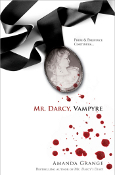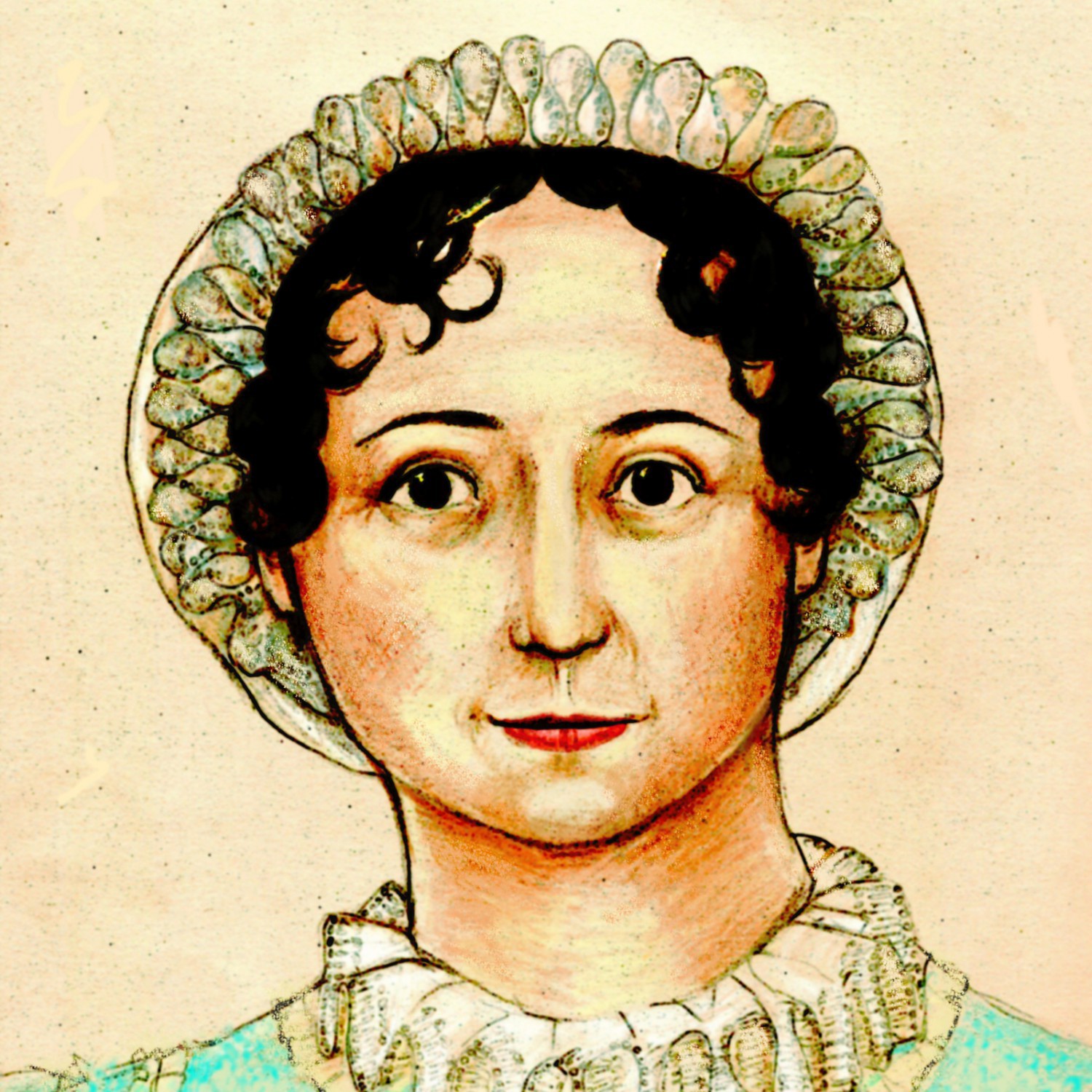 Now that the (around here, rather sodden) Halloween costumes have been put away and everyone is lying around dazed in a sugar-rush letdown, we thought we would extend the celebrations a bit. Amanda Grange has kindly agreed to answer some questions about her latest book, Mr. Darcy, Vampyre, a Jane Austen-horrid novel mashup that was written by someone who actually knows and likes Jane Austen’s novels. (Read our review of the book.) Also, find out how to enter to win a copy of the book! Continue reading
Now that the (around here, rather sodden) Halloween costumes have been put away and everyone is lying around dazed in a sugar-rush letdown, we thought we would extend the celebrations a bit. Amanda Grange has kindly agreed to answer some questions about her latest book, Mr. Darcy, Vampyre, a Jane Austen-horrid novel mashup that was written by someone who actually knows and likes Jane Austen’s novels. (Read our review of the book.) Also, find out how to enter to win a copy of the book! Continue reading
Mr. Darcy Vampyre
REVIEW: Mr. Darcy, Vampyre by Amanda Grange
Standard When Lady Catherine de Bourgh tells Elizabeth Bennet that Mr. Darcy comes from an ancient family…well, she isn’t just being a snob.
When Lady Catherine de Bourgh tells Elizabeth Bennet that Mr. Darcy comes from an ancient family…well, she isn’t just being a snob.
The beginning of the newlywed Darcys’ life together, in which Mr. Darcy takes advantage of the Peace of Amiens to show his wife continental Europe, should be a time of unalloyed happiness for Elizabeth Darcy–after all, if adventures will not befall a young lady in her own village, she must seek them abroad–but her joy in her marriage and her love for her husband are dimmed by worry. Why did she surprise a look of pure torment on Darcy’s face only a few hours after their wedding? Why does he not consummate their marriage, despite the obvious passion that they share? And why is Elizabeth dreaming of events that occurred over a hundred years previously–and of a mysterious, compelling gentleman who is not her husband? The mystery builds to a thrilling, chilling climax and a completely satisfying ending. There is plenty of romance and a few dangerously tender moments between the newlyweds. (Let’s face it, the whole bloodsucking thing is not a metaphor for playing whist, know what we mean?)
However, Mr. Darcy, Vampyre is more than just the simple addition of vampire lore to P&P; instead, Amanda Grange has crafted a clever homage to the Gothic novels that Jane Austen so enjoyed. As in all of Ms. Grange’s Austen-inspired novels, she has clearly done her homework, and Mr. Darcy, Vampyre most strongly echoes Ann Radcliffe’s tales of psychological horror, incorporating all the elements that knowledgeable fans of the Gothic expect: a trip through the roughest and most picturesque parts of the Continent; loving descriptions of the scenery (though fortunately, unlike Radcliffe, they don’t go on for page after tiresome page, and there is no doggerel poetry further slowing things down); mysterious castles with oddly-behaving servants; banditti, mercenaries, and fearful, violent villagers; an accident that, Elizabeth is told, portends death; a story of another young lady just like Lizzy who arrived under similar circumstances and met a bad end; and there even is a “black veil” moment, when our heroine sees something so horrid she has no choice but to swoon. The reader is not immediately enlightened to the horror, though we can guess it; and, again fortunately unlike Radcliffe, Ms. Grange does not keep us hanging until the end of the book and then come up with a lame afterthought to close the loop. We also felt echoes of Dracula, Polidori’s seminal story “The Vampyre,” Buffy the Vampire Slayer, Twilight, and even a smidgen of Harry Potter.
The book is an homage, not a parody, but there is a deep-lurking humor that recognizes the fun in Gothic novels, a tone set by the dedication (we won’t give it away, as we were not expecting it, and it made us laugh for a solid minute), and one that seems to us peculiarly English, and peculiarly in the style of Jane Austen’s humor. Just because Jane parodied The Mysteries of Udolpho and other horrid novels in Northanger Abbey doesn’t mean she didn’t like horrid novels. Like Henry Tilney, Jane likely read them in two days, her hair standing on end the whole time, and afterwards laughed at herself for falling for it; she could not have written such an affectionate parody in Northanger Abbey otherwise. Make no mistake: Mr. Darcy, Vampyre is absolutely not the kind of thing that Jane Austen wrote, but it certainly is the kind of thing she read.
Unlike recent Austen/monster “mashups,” nothing is overdone, there is not as much angst as one might expect, and there are no gross-outs. This is an Austen-inspired scary story for Janeites, by a Janeite, done with affection and delivered with a very subtle British wink, and completely suitable for a 21st-century audience. Our inner Catherine Morland thought it was tremendous fun, and knows not to take it too seriously; like the heroine of a horrid novel just kidnapped by three villains in horsemen’s great coats, hang on and enjoy the ride.
We are giving away a copy of Mr. Darcy, Vampyre to two lucky AustenBlog readers, courtesy of Sourcebooks. We’re trying something different this time; just respond in the comments (be sure to leave a working e-mail address; it won’t be seen by anyone but us) and we’ll use the Random Integer Generator to choose the numbers of the winners. If you want to comment but not be entered in the giveaway, just mention it in your comment. Comment as many times as you like, but only the first comment in the thread will be counted toward your entry. Also, the contest is open to U.S. and Canada addresses only. Sorry! ETA: Contest ends Wednesday, August 12, 2009 at 10 p.m. ET. ETA the Second: If your comment gets stuck in the spam filter, we’ll unstick it, don’t worry!
An exclusive excerpt from Mr. Darcy, Vampyre by Amanda Grange
Standard We will have a review of Mr. Darcy, Vampyre next week and a giveaway as well. In the meantime, author Amanda Grange has shared an exclusive excerpt from the novel with AustenBlog readers. Enjoy!
We will have a review of Mr. Darcy, Vampyre next week and a giveaway as well. In the meantime, author Amanda Grange has shared an exclusive excerpt from the novel with AustenBlog readers. Enjoy!
When they were about half way to France, Darcy went below to make sure that the horses were comfortable and not too distressed by the voyage, and to give instructions for their disembarkation when they should land. Elizabeth remained on deck, watching the other ships and from time to time seeing nothing but the ocean as the seas filled and emptied around her.
It was during one of these lulls that she saw a solitary sail on the horizon. She watched it lazily, but as it drew nearer she became aware of a change in the atmosphere and she felt a tension amongst the sailors. They began to look up from their work and to shade their eyes with their hands, turning in the direction of the vessel.
‘What is it?’ asked Elizabeth. ‘Is it a French vessel?’
‘It’s trouble,’ said the mate.
‘Aye,’ said one of the sailors. ‘Privateers. Pirates.’ Continue reading
